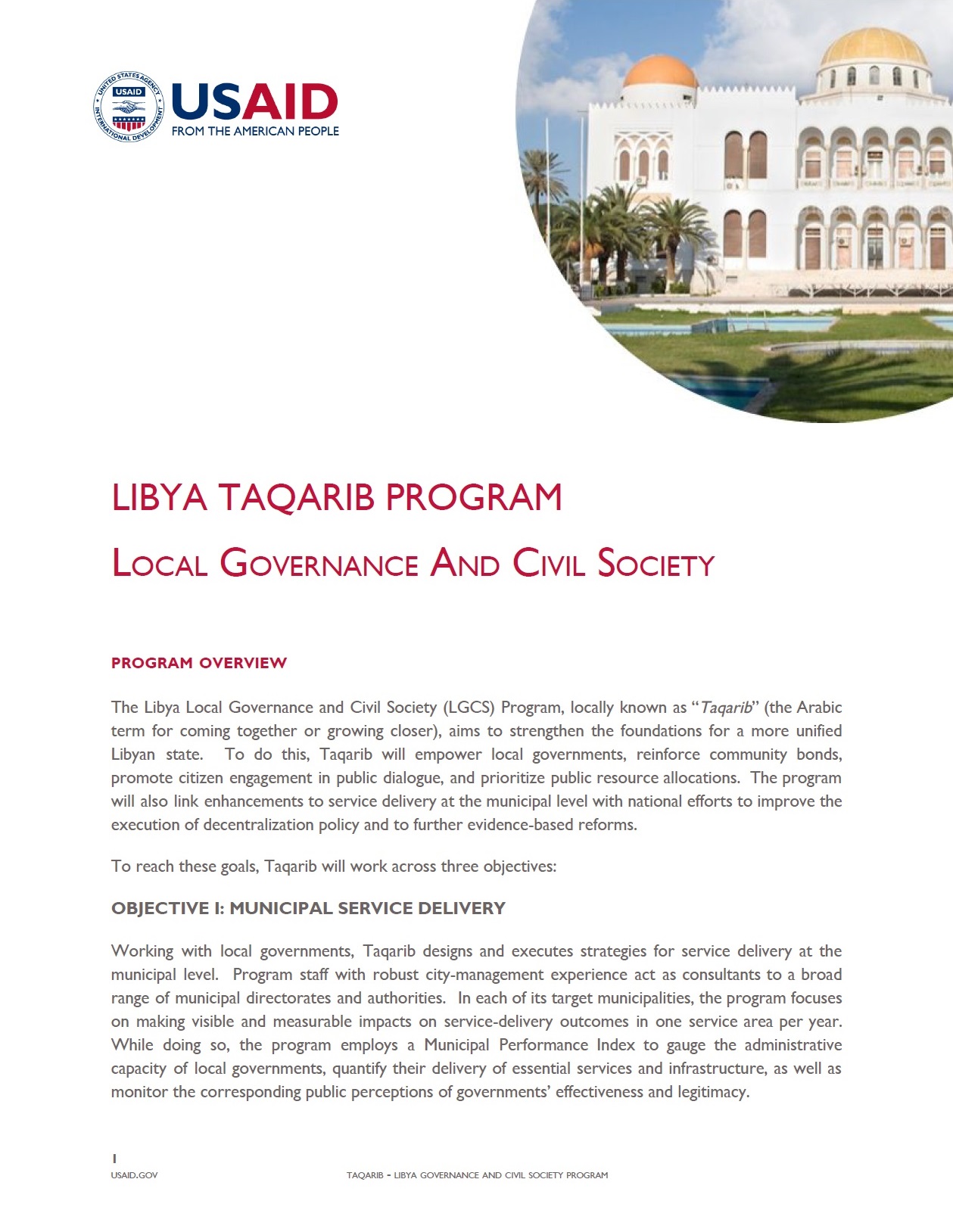Speeches Shim
PROGRAM OVERVIEW
The Libya Local Governance and Civil Society (LGCS) Program, locally known as “Taqarib ” (the Arabic term for coming together or growing closer), aims to strengthen the foundations for a more unified Libyan state. To do this, Taqarib will empower local governments, reinforce community bonds, promote citizen engagement in public dialogue, and prioritize public resource allocations. The program will also link enhancements to service delivery at the municipal level with national efforts to improve the execution of decentralization policy and to further evidence-based reforms.
To reach these goals, Taqarib will work across three objectives:
OBJECTIVE I: MUNICIPAL SERVICE DELIVERY
Working with local governments, Taqarib designs and executes strategies for service delivery at the municipal level. Program staff with robust city-management experience act as consultants to a broad range of municipal directorates and authorities. In each of its target municipalities, the program focuses on making visible and measurable impacts on service-delivery outcomes in one service area per year. While doing so, the program employs a Municipal Performance Index to gauge the administrative capacity of local governments, quantify their delivery of essential services and infrastructure, as well as monitor the corresponding public perceptions of governments’ effectiveness and legitimacy.
OBJECTIVE II: PUBLIC PARTICIPATION
Taqarib engages local communities and community organizations to ensure that citizens have a voice in prioritizing and monitoring the expenditure of public resources. As means for supporting the improvement of service-delivery, Taqarib partners with community organizations to generate public support for solutions, such as local revenue generation, public-private partnerships, city-to-city collaboration, and other tools that facilitate achieving long-term, sustainable development.
OBJECTIVE III: POLICY EXECUTION AND REFORM
In its approach to policy and policy reform, Taqarib seeks alignment with existing regulations and laws that support decentralization especially including Law 59 and Executive Order 130. Taqarib also ensures that the relevant parts of existing municipal development plans receive forceful backing from the program’s strategies for service-delivery improvement. In seeking these alignments, Taqarib preserves space for the appreciation and scaling of innovative policy solutions at the local level, some of which the law may not explicitly prescribe, and which therefore may contribute to the evidence-base for local and national reform.
- Life of Program: July 2019 to July 2023
- USAID Implementing Partner: Development Alternatives International (DAI)
- USAID Investment: $35.9 million
PROGRAM ACTIVITIES
- Taqarib will support approximately 30 Libyan municipalities to improve organizational performance and to design and implement tangible service delivery improvements that citizens see and feel daily.
- Taqarib will empower Libyan men and women, including youth and minority groups, to participate in advocacy and government decision making processes, including municipal budgeting and planning.
- Taqarib will work in concert with other USAID/Libya activities to support national-level policy dialogues and decision-making related to Libya’s ongoing decentralization process.
LOCATIONS : Taqarib has offices in Tripoli, Benghazi (coming soon), Sebha (coming soon), and Tunis. By the second year, the project will be active in 30 municipalities, nationwide.


Comment
Make a general inquiry or suggest an improvement.